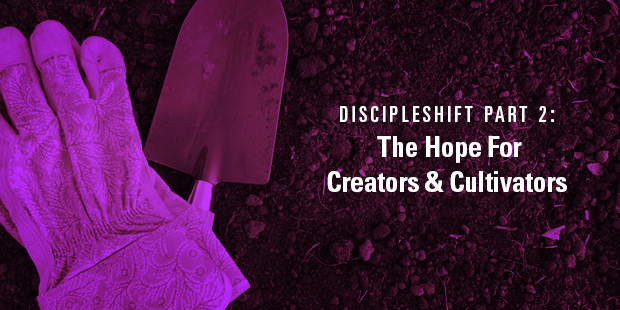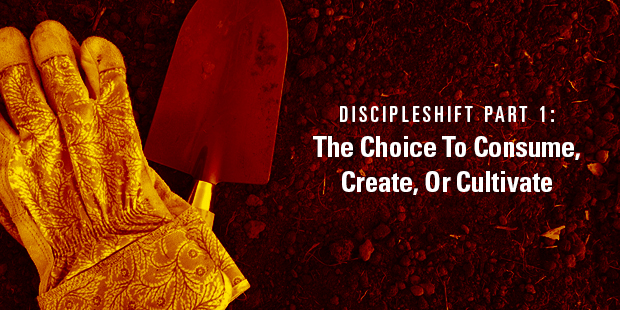
DiscipleShift Part 2: The Hope for Creators & Cultivators
Last week, I wrote an article about our free time and the choices we have: to consume, to cultivate, or to create.
Today, I want to extend that idea beyond the choices we make in our leisure time to our responsibility as churchgoers and disciple-makers.
Wistful Toward the Past
Young people who have grown up in church sometimes tell me about the awesome youth group they were part of or the college ministry that made an impact on them. The church made them feel welcome. Leaders made them a part of the community. Intentional cultivation of relationships led to growth in holiness. They sense wonder and gratitude when they think of the people who poured into their lives.
Fast forward a few years. The 20-somethings are now in a young-married group, or they’re just beginning their family, or they’re single and want to stay connected to church. What happens next?
Too often, I see people at this stage look back with fondness and with a touch of nostalgia at the days when they benefited from a thriving student ministry. They miss those days and regret that they’ve passed. They wonder if they’ll ever have that kind of experience again. That’s when I usually say something like this:
It’s time to shift your mindset.
You shouldn’t look at the church as if you were a consumer, expecting a certain kind of experience. Now is the time you should ask, “How can I create or cultivate that life-changing culture and experience for someone else?” Once you move from seeing yourself as a consumer, to a creator or cultivator, you will arrive at the place where pouring into others brings just as much (if not more) joy than when others were pouring into you.
As we grow in holiness and discipleship, we must move from seeing ourselves as passive consumers of experiences that other people have created for us, and begin to see ourselves as ministers through whom God can work in the lives of the people coming up behind us.
Grandma’s Christmas Brunch
Imagine it’s Christmas morning, and Grandma has gotten up every Christmas morning for 30 years and fixed everyone a big brunch—bacon, sausage, biscuits, gravy, eggs, and fruit salad. Year after year, she joyfully spreads out that food for everyone to feast on.
At some point, if Grandma gets sick, or if Grandma has trouble pulling it off, or if by chance death takes her sooner than you expect, everyone else at the table will have to wake up and realize that if someone doesn’t do what Grandma did, we’ll never have this experience again.
Someone has to step up and say, “For 30 years, Grandma created this experience for us through her cooking and her feast. We’re going to carry it on and create this for everyone else now.” Someone has to move from the posture of ‘consumer’ to ‘creator,’ to ensure that the responsibility to create and cultivate an environment must move to the next generation. Otherwise, the tradition will disappear.
Apply that idea to student ministry. To Sunday school. To evangelism. To mission work. To community service. To choirs and worship teams. To ushers and deacons.
Cultivate and Create
We can sit around and wax nostalgic, reflecting on the good old days when people did this or that, or we can stand up and take our place as those responsible for pouring into others. The choice is ours.
Too many never make that philosophical jump. They continue to see their relationship to church as one of a consumer and thus never know the joy of becoming a creator or cultivator. When we fail to make this shift, church ministry sags and suffers. Transformative experiences fade away. Programs fall apart.
Don’t miss out on the next stage of ministry. Don’t be content with benefiting from others’ work on your behalf without ever experiencing how God wants to work through you on behalf of others.
Discipleship isn’t just about making disciples, but about making disciples who make disciples. It takes creativity and cultivation to sustain a disciple-making culture. We need consumers to shift their mindset until they become creators and cultivators, for the glory of God and the good of the church.

Tags: Creator, Discipleshift, Trevin Wax














